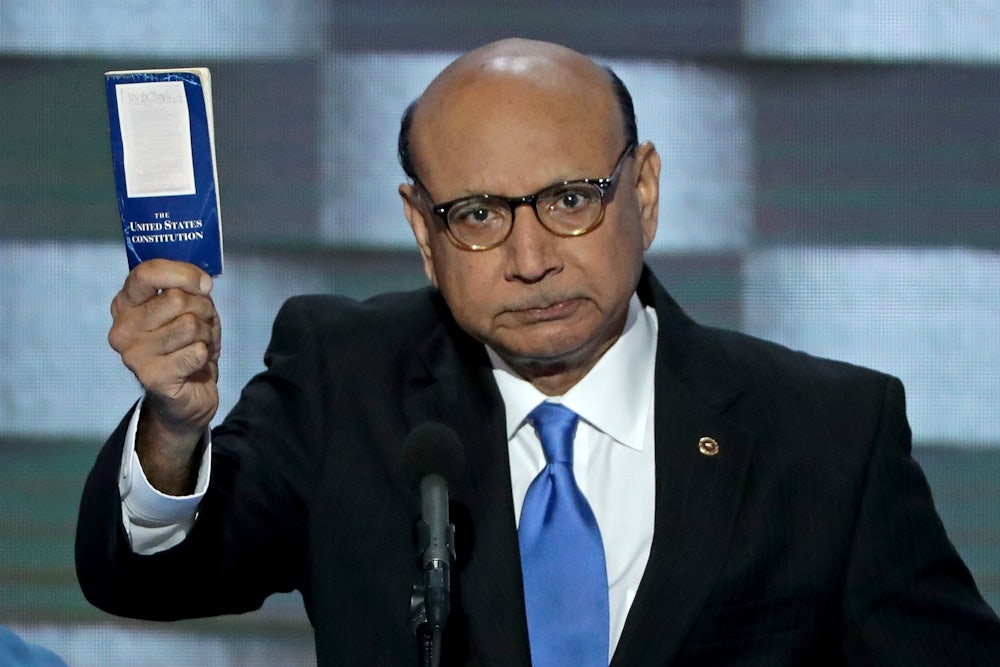
Khizr Khan, the father of the fallen U.S. Army Captain Humayun Khan, took to the stage of the Democratic National Convention in July and looked into the camera to address the Republican nominee Donald Trump directly. “Have you even read the United States Constitution?” Khan asked while holding up a little blue book as the crowd cheered. “I will gladly lend you my copy.”
Five months later, it’s clear that Trump, now our president-elect, never took Khan up on that offer. Instead, he consistently rallied his base behind policies that, according to legal experts, flout core tenets of constitutional law. These proposals included the wholesale deportation of millions of undocumented immigrants, a ban on Muslims entering the country, the surveillance of American-Muslims, the return of torture in criminal interrogation, restrictions on the press, and the outlawing of flag-burning.
Of course, what is and isn’t constitutional is a constant source of debate. Every controversial Supreme Court decision is assailed by its critics as an affront to the Constitution, even as its supporters hail a victory for constitutional rights. There were plenty of such examples this year, including the Supreme Court upholding the affirmative action program at the University of Texas and Apple winning a major data privacy battle against the FBI when it refused to assist in unlocking the iPhone of the San Bernardino shooter.
But Trump, the one-man wrecking ball, has distinguished himself by popularizing norms that are fundamentally at odds with principles that have guided the republic for 229 years. Here’s how he did it:
Deporting undocumented immigrants en masse
In a 60 Minutes interview last November, Trump said that he hoped to model his deportation of 11 million undocumented immigrants after Dwight Eisenhower’s Operation Wetback. He suggested “rounding them up in a very human way, a very nice way,” then transporting them en masse across the border.
The problem is that there is no feasible way to “round up” millions of undocumented immigrants without violating the Fourth Amendment, which protects against unreasonable searches and seizures. In order to make an immigration stop—be it on the street or in a workplace raid—enforcement officials must have sufficient reason to suspect that an individual is undocumented, said Kevin Johnson, the dean of UC Davis School of Law and an expert in immigration law. Further, the Supreme Court in 1975 held that “Mexican appearance” alone cannot be the basis of suspicion. And in 2016, a federal court found that Joe Arpaio, the controversial sheriff from Maricopa County, Arizona, violated the Constitution by relying on racial profiling.
Furthermore, Trump has promised to deport undocumented immigrants immediately upon assuming office. But non-citizens are legally entitled to a removal process that complies with the Due Process clause of the Fifth Amendment, Johnson said. That means every one of those millions of undocumented immigrants needs, at minimum, a hearing and the opportunity to prepare a case and present evidence.
Banning and surveilling Muslims
Following the 2015 San Bernardino shooting, Trump advocated for “a total and complete shutdown of Muslims entering the United States until our country’s representatives can figure out what is going on.” He again called for the so-called Muslim ban after the Pulse nightclub shooting in Orlando in the summer of 2016.
Trump justified his plan under a section of U.S. immigration code that gives the president broad powers to suspend immigration for national security purposes:
Whenever the President finds that the entry of any aliens or of any class of aliens into the United States would be detrimental to the interests of the United States, he may by proclamation, and for such period as he shall deem necessary, suspend the entry of all aliens or any class of aliens as immigrants or nonimmigrants, or impose on the entry of aliens any restrictions he may deem to be appropriate.
But that doesn’t make it constitutional. Johnson said it raises serious questions under the Equal Protection clause, which requires states to treat an individual in the same manner as others in similar conditions and circumstances, as well as the Due Process clause.
Further, Trump called for surveillance of American Muslims, including the creation of a Muslim registry and monitoring Muslim neighborhoods and places of worship. The proposal would violate the First and Fifth Amendments, according to the American Civil Liberties Union. “Thanks to the right to equal protection under the law guaranteed by the Fifth Amendment, courts are rightly very suspicious of any law or government policy that singles out groups of people united by a core characteristic, like race or religion,” wrote Anthony D. Romero, the ACLU’s Executive Director.
Bringing back torture
In February, Trump told ABC’s George Stephanopoulos that he “would absolutely authorize something beyond waterboarding.” He later added on the trail, “Don’t tell me it doesn’t work—torture works.”
Aside from its multiple conflicts with international law, the use of torture in criminal interrogation tactics is rife with constitutional violations, said Steven Schwinn, a constitutional law expert at the John Marshall School of Law. Torture is incompatible with the Eighth Amendment’s prohibition on cruel and unusual punishment, the Fifth Amendment’s Due Process requirement, and potentially the First Amendment if used to punish lawful speech or advocacy, lawful associations, or lawful religious practices.
History has not looked kindly upon the Bush administration’s attempt to rationalize the use of torture. The administration did not concede that tactics like waterboarding constituted torture. And it also argued that Bush could give the order to torture through the inherent commander-in-chief authority under Article II of the Constitution and the 2002 Authorization for Use of Military Force:
“The President is authorized to use the Armed Forces of the United States as he determines to be necessary and appropriate in order to . . . defend the national security of the United States against the continuing threat posed by Iraq.”
But most lawyers agree that it’s nonsense. “Nearly everyone who has seriously looked at the questions believes that the Bush administration mis-defined torture, that inherent commander-in-chief authority does not authorize torture, that the AUMF does not authorize torture, and that torture is plainly illegal,” Schwinn said.
Broadening libel laws
Going a step beyond the intimidation tactics he used against reporters on the campaign trail, Trump said in an interview with The Washington Post editorial board in March that he wants to “open up libel laws” such that he would be allowed to sue news outlets that publish stories he believes are wrong. In October, he threatened to do just that after The New York Times published a story detailing sexual assault allegations against Trump from several women:
Trump campaign just released this letter from his lawyers demanding a full retraction/apology from the New York Times. pic.twitter.com/QobvFbCllb
— McKay Coppins (@mckaycoppins) October 13, 2016
Luckily for reporters, “libel law is mostly, or completely, a state responsibility, so Trump will have no control over it,” Schwinn said. Additionally, the Supreme Court has affirmed First Amendment protections for journalists against libel allegations. In the 1964 decision New York Times v. Sullivan, the Court established the “actual malice” standard requiring the plaintiff in a libel suit to prove that a publication (1) knowingly published falsities or (2) had “reckless disregard for the truth.” It is very difficult to sue a publication under that standard.
That said, Trump has expressed empathy for Hulk Hogan, who successfully sued Gawker for $115 million in damages for publishing clips from a sex tape, causing the company to declare bankruptcy. The Hogan suit has become a landmark case for seemingly narrowing what courts consider to be a “matter of public concern” that the media can justifiably report. Even if Trump cannot tangibly alter libel laws, it is foreboding that he would look to Hulk Hogan as an example of how to deal with the press.
Outlawing flag-burning
After protesters burned the American flag in cities across the country following Trump’s election, he responded on Twitter by suggesting that such an act should be punishable by law:
Nobody should be allowed to burn the American flag - if they do, there must be consequences - perhaps loss of citizenship or year in jail!
— Donald J. Trump (@realDonaldTrump) November 29, 2016
The debate surrounding flag-burning has been exhausted already: The Court ruled against both Congress and state legislatures that separately tried to ban the practice. Well-established legal precedent identifies flag-burning as symbolic, protected speech. Additionally, Americans cannot be stripped of their citizenship without their express consent as a result of a 1958 case. “There’s no ambiguity here,” Schwinn said. “Flag-burning is protected by the First Amendment. This means that government can’t punish flag-burning as a political statement.”
